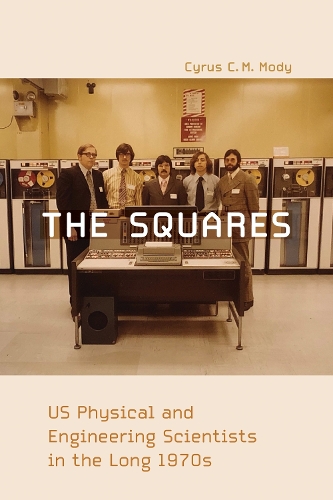
The Squares: US Physical and Engineering Scientists in the Long 1970s
(Paperback)
Publishing Details
The Squares: US Physical and Engineering Scientists in the Long 1970s
By (Author) Cyrus C. M. Mody
MIT Press Ltd
MIT Press
30th August 2022
United States
Classifications
General
Non Fiction
502.373
Physical Properties
Paperback
422
Width 152mm, Height 229mm
Description
When ungroovy scientists did groovy science- how non-activist scientists and engineers adapted their work to a rapidly changing social and political landscape. In The Squares, Cyrus Mody shows how, between the late 1960s and the early 1980s, some scientists and engineers who did not consider themselves activists, New Leftists, or members of the counterculture accommodated their work to the rapidly changing social and political landscape of the time. These "square scientists," Mody shows, began to do many of the things that the counterculture urged- turn away from military-industrial funding, become more interdisciplinary, and focus their research on solving problems of civil society. During the period Mody calls "the long 1970s," ungroovy scientists were doing groovy science. Mody offers a series of case studies of some of these collective efforts by non-activist scientists to use their technical knowledge for the good of society. He considers the region around Santa Barbara and the interplay of public universities, think tanks, established firms, new companies, philanthropies, and social movement organizations. He looks at Stanford University's transition from Cold War science to commercialized technoscience; NASA's search for a post-Apollo mission; the unsuccessful foray into solar energy by Nobel laureate Jack Kilby; the "civilianization" of the US semiconductor industry; and systems engineer Arthur D. Hall's ill-fated promotion of automated agriculture.
Reviews
Included in Physics Today's "Books and more that stood out in 2022" list
"In The Squares, historian Cyrus Mody examines what it was like to be an ordinary, or 'square,' physicist during the 1970s. Although that decade is typically seen as being more culturally conservative than the flower-power 60s, Mody demonstrates that it was an era in which even many physicists who self-identified as apolitical began working on societally engaged research topics such as solar power... The squares arefortunate that a person of Modys talents has taken them up.
Physics Today
Essential and illuminating reading for historians of the technosciences, the military-industrial-academic complex, the silent majority, and postboom economies.
Technology and Culture
Author Bio
Cyrus C. M. Mody is Professor of the History of Science, Technology, and Innovation and Director of the Maastricht University Science, Technology and Society Studies program. He is the author of Instrumental Community- Probe Microscopy and the Path to Nanotechnology and The Long Arm of Moore's Law- Microelectronics and American Science (both published by the MIT Press).
